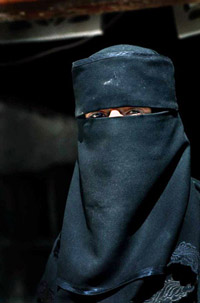The French senate approved a law Sept. 14 banning any veils that cover the face — including the burqa, the full-body covering worn by some Muslim women — making France the first European country to nationally impose such a ban.

Wikimedia Commons
The French senate approved a law banning any veils that cover the face, including the niqab worn by Muslim women.
A sociocultural anthropologist at Washington University in St. Louis who has written extensively on this subject says that the French government is finding it easier to fight clothing than to fight poverty and violence.
“France passed a law that prohibits covering the face in public, but that really is aimed at the relatively small number of Muslim women who wear the face-covering niqab,” says John R. Bowen, Ph.D., the Dunbar-Van Cleve Professor in Arts & Sciences.”
Bowen is author of Can Islam be French? Pluralism and Pragmatism in a Secularist State (2009) and Why the French Don’t Like Headscarves: Islam, the State and Public Space (2007). His current research focuses on comparative social studies of Islam across the world.
“Michèle Alliot-Marie, minister of justice, said that wearing such clothes contradicts French principles of dignity and equality,” he says. “No women in France have said they were forced to wear this garment, however. To the contrary, niqab-wearers consistently tell reporters that they are following their own ideas about how best to live a dignified life as a Muslim woman.”
Given that there are no allegations of harm, that the practice is seen as religious and that we have here two conflicting ideas of dignity, “one might have thought the government of a country with a large Muslim population and a commitment to religious freedom would hesitate before once again pointing the finger at Muslim clothing,” Bowen says.
“But it is easier to fight clothing than it is to fight poverty, discrimination, and, if we are to discuss women’s dignity, domestic violence.”
Bowen says that France now joins Iran and Saudi Arabia as countries that tell its police force to use their time to inspect women’s garments.
“But either France’s own Constitutional Council or, eventually the European Court of Human Rights, may rule that the law violates religious freedom — and this outcome may have been what some lawmakers wished for all along: make a statement but be spared its enforcement.”
Bowen will serve as a prosecution witness Sept. 20 during filming of the television series World on Trial. A cast of legal all-stars headlined by Cherie Booth Blair, international human rights barrister and wife of former British Prime Minister Tony Blair and acclaimed human rights advocate and author Randall Robinson will try the “headscarf law” case at Penn State Law School.